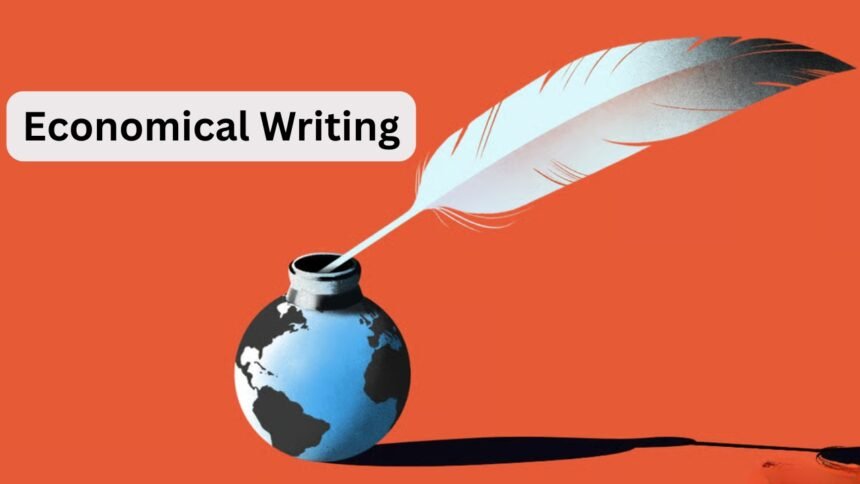In the world of content creation, one ability stands above the rest—economical writing. This method of writing allows creators to convey their message clearly and effectively, without unnecessary words or excess. Economical writing is about making each word count and engaging your audience while respecting their time. In an era where attention spans are shrinking, mastering economical writing can not only improve the readability of your content but also enhance its impact.
Economical writing isn’t about sacrificing creativity; it’s about honing the craft to deliver your ideas in the most concise and powerful way possible. For those looking to improve their content creation process, understanding the importance of brevity, precision, and clarity in writing is essential.
What Is Economical Writing?
Economical writing is the art of using the fewest words to express the maximum meaning. It focuses on removing filler content, redundancy, and unnecessary details, ensuring that every sentence serves a purpose. This writing style is particularly effective in various contexts, from academic articles to marketing copy, where attention to detail and clarity are essential.
The goal of economical writing isn’t to strip the content of its richness but to ensure that each word plays a crucial role in achieving the writer’s objective. Whether you’re writing a blog post, an advertisement, or a professional report, economical writing ensures that your message is delivered in a clear, direct, and engaging manner.
Why Is Economical Writing So Important?
In the digital age, readers have limited time to consume content, making it more important than ever to get to the point quickly. According to a study by Nielsen Norman Group, web users spend an average of 10-20 seconds on a website before deciding whether to stay or leave. This means that your content must be immediately engaging and easy to digest. Economical writing allows you to capture attention and maintain reader interest by cutting through the fluff and focusing on what truly matters.
Moreover, economical writing helps improve SEO (Search Engine Optimization). By eliminating unnecessary filler words, you allow search engines to focus on the most relevant keywords and phrases, enhancing your content’s visibility.
The Key Components of Economical Writing
Clarity and Precision
One of the most important aspects of economical writing is clarity. The key to clarity is ensuring that your language is simple, direct, and to the point. Use precise vocabulary and avoid jargon unless it’s necessary for your audience. For instance, instead of saying “due to the fact that,” use “because.”
Moreover, aim to eliminate redundancy. For instance, phrases like “each and every” or “basic fundamentals” can be shortened to “each” or “fundamentals,” respectively, without losing any meaning. By cutting out redundant words and phrases, you make your writing more powerful and to the point.
Active Voice vs. Passive Voice
Economical writing often favors the active voice over the passive voice. Active voice is more direct and engaging, making sentences more concise. For example:
- Passive: “The report was written by Sarah.”
- Active: “Sarah wrote the report.”
The active voice creates a sense of immediacy, making it easier for readers to engage with your content.
Short Sentences and Paragraphs
Economical writing isn’t just about the words you choose; it’s also about structure. Long, complex sentences can confuse readers and lead to unnecessary wordiness. Shorter sentences and paragraphs improve readability and ensure your content flows more smoothly.
Try to break up your content into digestible pieces. Instead of cramming multiple ideas into one paragraph, focus on one point per paragraph, making the overall structure more user-friendly. This will help readers stay engaged and understand the message without feeling overwhelmed.
A Powerful Quote on Economical Writing
As William Strunk Jr., a celebrated English professor, famously said in his book The Elements of Style:
“Vigorous writing is concise. A sentence should contain no unnecessary words, a paragraph no unnecessary sentences.”
This quote captures the essence of economical writing: every word, sentence, and paragraph must serve a purpose. Strunk’s advice remains timeless and is a cornerstone of good writing.
How to Practice Economical Writing
Start by Outlining
Before diving into writing, take the time to outline your ideas. This helps you stay focused and ensures that each section of your writing serves a specific purpose. Outlining your content before you start writing is a useful tool for staying on track and ensuring that you only include what’s necessary.
Edit Ruthlessly
Writing economically doesn’t stop after the first draft. In fact, editing is where the magic happens. Go through your content multiple times, looking for ways to eliminate superfluous words or phrases. Ask yourself:
- Does this sentence add value to my content?
- Can I convey this idea in fewer words?
By editing ruthlessly, you ensure that only the most important and relevant information remains in your content.
Avoid Over-Explaining
It’s easy to fall into the trap of over-explaining concepts, especially when you’re passionate about the topic. However, long-winded explanations can bore the reader. Focus on delivering the core message, and provide examples or elaborations only when necessary. This allows you to keep the content engaging while staying concise.
Keep the Reader in Mind
Remember that your audience has limited time and patience. You want to respect their time by delivering valuable, easy-to-understand information. Knowing your reader’s needs and interests can help you tailor your writing to provide just the right amount of detail.
Economical Writing in the Age of SEO
SEO and Concise Content
Search Engine Optimization (SEO) thrives on quality content, and economical writing plays a vital role in enhancing that quality. Search engines prioritize content that is well-written, easy to read, and relevant. By focusing on the core message and removing fluff, you can improve your chances of ranking higher on search engines.
Incorporating the target keyword strategically throughout your content, especially in headings and subheadings, can further boost your SEO efforts. By balancing keyword usage with clear, concise writing, you can create content that not only appeals to readers but also to search engines.
LSI Keywords and Content Optimization
Latent Semantic Indexing (LSI) keywords are terms related to your primary keyword that help search engines understand your content better. By using LSI keywords, you add depth to your content while maintaining conciseness. For instance, for the keyphrase “economical writing,” LSI keywords might include terms like “concise writing,” “clear writing,” “effective writing,” or “short and powerful sentences.”
Incorporating these LSI keywords naturally into your content helps it rank for a broader range of related search terms, driving more traffic to your website.
Conclusion: Embrace the Art of Economical Writing
Economical writing isn’t just about trimming words; it’s about refining your message to make a powerful impact. By mastering the art of writing concisely and effectively, you improve both the readability and SEO performance of your content. Remember, brevity doesn’t mean a lack of substance—it means you’re communicating more efficiently and clearly.
As you continue to practice economical writing, keep refining your skills by focusing on clarity, precision, and structure. With the right balance of concise language and engaging storytelling, you can keep your readers hooked while delivering valuable insights. Whether you’re crafting blog posts, reports, or marketing content, economical writing will always serve you well in achieving your communication goals.
Embrace the power of economical writing, and watch your content become more impactful, engaging, and successful.
you may also like
The Role of Economics in Business Growth: Key Insights for Entrepreneurs






